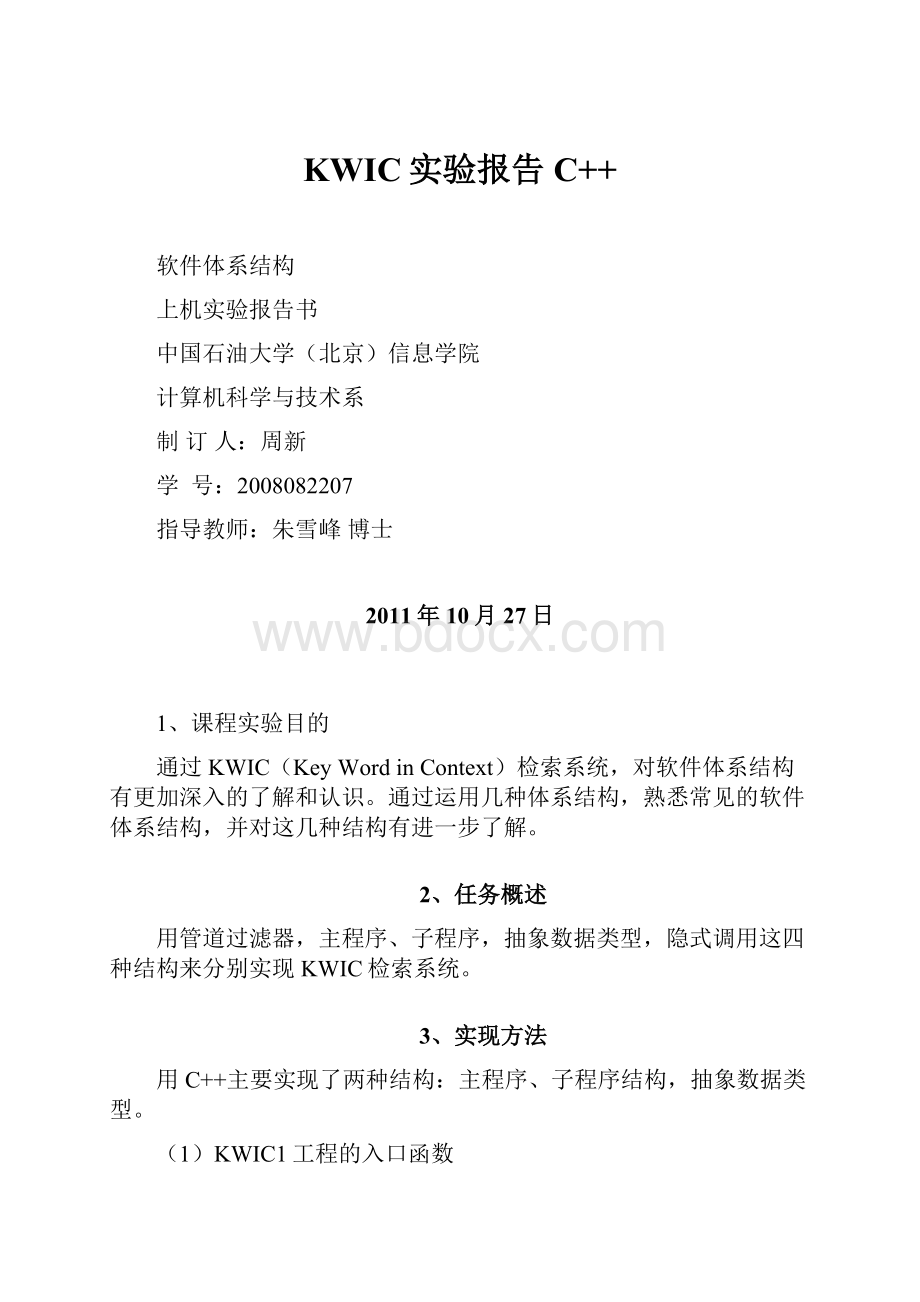KWIC实验报告C++文档格式.docx
《KWIC实验报告C++文档格式.docx》由会员分享,可在线阅读,更多相关《KWIC实验报告C++文档格式.docx(19页珍藏版)》请在冰豆网上搜索。

2isAbstractDataTypes"
endl;
intchoose=0;
choose;
if(1==choose)//主程序和子程序
{
MainSubroutinemainSub;
vector<
vector<
string>
>
lines=mainSub.readLines(filename);
LINE>
lineIndex=mainSub.shiftString(lines);
lineIndex=mainSub.firstAlphaSort(lineIndex,lines);
mainSub.outPut(lineIndex,lines);
}
else//抽象收据类型
Lines*lines=newLines;
Inputinput;
Shift*shift=newShift;
FirstAlphaSortalphaSort;
Outputoutput;
input.readLines(filename,*lines);
shift->
circularShift(*lines);
alphaSort.alphaSort(*shift);
output.print(alphaSort);
deleteshift;
deletelines;
return0;
}
(2)主程序、子程序结构实现类
//从文件中按行读取
MainSubroutine:
:
readLines(char*filename)
vector<
dst;
ifstreaminfile(filename,ios:
in);
if(!
infile)
cout<
openerror!
exit(0);
chartemp[100]="
//存储从文件中读取的行的临时变量
//按行读取
while(infile.getline(temp,100))
intk=0,j=0;
line;
line.swap(vector<
());
chars[20]="
//存储从行中取字符串的临时变量
while(temp[k]!
=0)
{
//每个单词的截取条件为下一个字符为空格或者为行的末尾
if((temp[k+1]=='
'
||temp[k+1]==0)&
&
temp[k]!
='
)
{
s[j]=temp[k];
s[j+1]='
\0'
stringss=s;
line.push_back(ss);
j=0;
}
elseif(temp[k]=='
else
j++;
k++;
}
dst.push_back(line);
//将从文件中中读出的行加入到dst中
infile.close();
for(inti=0;
i<
dst.size();
i++)
for(intj=0;
j<
dst.at(i).size();
j++)
cout<
dst[i][j]<
"
returndst;
//循环左移
shiftString(vector<
srcLines)
shiftLines;
for(introw=0;
row<
srcLines.size();
row++)
intcolnum=srcLines[row].size();
//获取每一行的字符串个数
//对第row行循环colnum(字符串个数)次,生成循环移位后的colnum行
for(intcol=0;
col<
colnum;
col++)
LINElinePos;
//声明存放一行的行标以及各列的列表的结构体
linePos.rowIndex=row;
//给行标赋值
//循环生成一行的列标
for(intcolshift=0;
colshift<
colshift++)
linePos.colIndex.push_back((col+colshift)%colnum);
//取模运算
shiftLines.push_back(linePos);
returnshiftLines;
//字母排序
firstAlphaSort(vector<
lineIndex,vector<
char>
firstChar;
dstIndex;
firstCharLine;
//逐行提取各个字符串的首字母
srcLines[row].size();
firstCharLine.push_back(srcLines[row][col][0]);
firstChar.push_back(firstCharLine);
//
introwPos=0;
intcolPos=0;
//外面的两层for循环是控制循环次数的
//内部的两层for循环是遍历所有的字符串首字母,寻找最小的字母
firstChar.size();
firstChar[row].size();
charmin='
z'
for(introw=0;
for(intcol=0;
{
if(min>
=firstChar[row][col]&
'
!
=firstChar[row][col])
{
rowPos=row;
colPos=col;
min=firstChar[row][col];
}
}
firstChar[rowPos][colPos]='
intlinePos=0;
//在原行矩阵中的位置
for(intline=0;
line<
rowPos;
line++)
linePos+=srcLines[line].size();
linePos=linePos+colPos;
dstIndex.push_back(lineIndex[linePos]);
returndstIndex;
//按照lineIndex中的字符串的行标和列标输出所有字符串
voidMainSubroutine:
outPut(vector<
lineIndex,vector<
lineIndex.size();
lineIndex[row].colIndex.size();
srcLines[lineIndex[row].rowIndex][lineIndex[row].colIndex[col]]<
(3)抽象数据类型结构实现
行存储类
//增加行
//参数:
line字符串向量列表
voidLines:
addLine(vector<
line)
lines.push_back(line);
//从存储结构中获取某一行
lineIndex为获取的行的序号,从0开始
//返回获取的行
Lines:
getLine(intlineIndex)
returnlines[lineIndex];
//增加字符串
instring为所添加字符串,lineIndex为字符串所在行的序号(从0开始)
addString(stringinstring,intlineIndex)
lines[lineIndex].push_back(instring);
//获取字符串
lineIndex为行序号,stringIndex为字符串在行中的序号
//返回获取的字符串
stringLines:
getString(intlineIndex,intstringIndex)
returnlines[lineIndex][stringIndex];
//增加字符
inchar为增加的字符,stringIndex为增加的字符所在的字符串的序号,lineIndex为增加的字符所在的行的序号
addChar(charinchar,intstringIndex,intlineIndex)
lines[lineIndex][stringIndex].push_back(inchar);
//获取字符
lineIndex为行序号,stringIndex为字符串的序号,charIndex为字符的序号
//返回获取的字符
charLines:
getChar(intlineIndex,intstringIndex,intcharIndex)
returnlines[lineIndex][stringIndex][charIndex];
//获取总的行数
intLines:
getLineNum(void)
returnlines.size();
//获取特定行的字符串个数
getStringNum(intlineIndex)
returnlines[lineIndex].size();
输入类
voidInput:
readLines(char*filename,Lines&
readLines)
//vector<
intlineIndex=0;
//行序号
readLines.addLine(line);
intstringIndex=0;
//字符串序号
readLines.addString(s,lineIndex);
if(temp[k]!
readLines.addChar(temp[k],stringIndex,lineIndex);
if(temp[k]=='
temp[k+1]!
//readLines.addChar(temp[k],stringIndex,lineIndex);
//将该字符串加入到指定行的指定字符串中
//readLines.addChar('
stringIndex,lineIndex);
s[0]='
//清空字符串
readLines.addString(s,lineIndex);
stringIndex++;
//字符串序号加1
lineIndex++;
//dst.push_back(line);
readLines.getLineNum();
readLines.getStringNum(i);
readLines.getString(i,j)<
循环左移类
//实现所有行的循环移位
voidShift:
circularShift(LinessrcLines)
srcLines.getLineNum();
intcols=srcLines.getStringNum(row);
cols;
vector<
newLine;
lineShift.addLine(newLine);
for(intnewcol=0;
newcol<
newcol++)
lineShift.addString(srcLines.getString(row,(col+newcol)%cols),lineIndex);
lineIndex++;
//获取所有行
LinesShift:
getLines(void)
returnlineShift;
//获取某一行
Shift:
returnlineShift.getLine(lineIndex);
//获取某一行中某一位置的字符串
stringShift:
returnlineShift.getString(lineIndex,stringIndex);
//获取某一行中某一个字符串中的某一位置的字符
charShift:
returnlineShift.getChar(lineIndex,stringIndex,charIndex);
//获取行数
intShift:
returnlineShift.getLineNum();
//获取某一行的字符串个数
returnlineShift.getStringNum(lineIndex);
排序类
//实现按首字母排序
voidFirstAlphaSort:
alphaSort(ShiftsrcShiftLines)
shiftLines=srcShiftLines;
//将传进得Shift对象赋值给成员变量
shiftLines.getLineNum();
firstChar.push_back(shiftLines.getChar(row,0,0));
//获取首字母
//首字母排序
for(intloop=0;
loop<
loop++)
charmin='
introwIndex=0;
for(introw=0;
if(min>
=firstChar[row]&
=firstChar[row])
min=firstChar[row];
rowIndex=row;
charSort.push_back(rowIndex);
firstChar[rowIndex]='
//将找到的最小的字母置为‘’,以便在下一次查找时不再保留
//首字母排序
int>
FirstAlphaSort:
getCharSort()
returncharSort;
intFirstAlphaSort:
returnshiftLines.getLineNum();
//按行的序号,将各字符串合并成一个字符串,然后获取一行
//lineIndex为行序号
stringFirstAlphaSort:
getLineAsString(intlineIndex)
stringlineString;
for(intstrCount=0;
strCount<
shiftLines.getStringNum(lineIndex);
strCount++)
lineString+=shiftLines.getString(lineIndex,strCount)+"
lineString+="
\0"
returnlineString;
输出类
//按字母表顺序输出
voidOutput:
print(FirstAlphaSortsortLines)
sortLines.getLineNum();
sortLines.getLineAsString(sortLines.getCharSort()[row])<
4、实验的例程
(1)主程序、子程序运行结果
(2)抽象收据类型
5、总结
通过本次实验,首先对软件体系结构有了更真切的了解,尤其是对管道过滤器结构,主程序、子程序结构,抽象数据类型结构,隐式调用这四种结构的理解更加透彻了。
同时还对KWIC有个一个认知的过程。
在实现的上述两种结构的过程中,对增强了数据结构的掌握,以及对面向对象概念的进一步理解。
编程时,遇到了各种大大小小的问题,尤其是数据结构定义方面的,深刻体会到了数据结构的重要性,同时发现了自己编写的代码移植性以及编码风格都不是很好,希望老师给予指点。